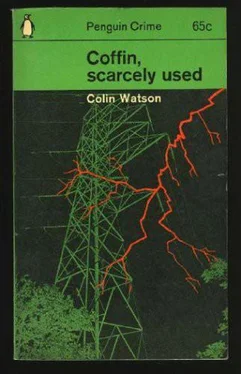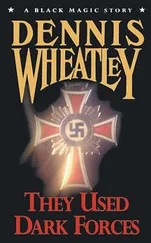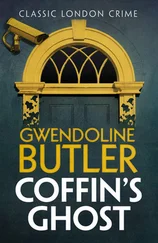“These are all ‘for sales’ that Mr Gwill brought in himself,” he announced. He pointed to the final line of one advertisement. “You see that box number. It has the letters C.S. in front of it. You’ll notice the others have as well. None of the ordinary ads have anything but figures as box references. We used to sort out the replies with C.S. numbers and put them through directly to the boss.”
“Were those his instructions?” Lintz asked.
“They were,” affirmed House, with the air of having settled the matter once and for all.
But Lintz remained inquisitive. “Where did the copy come from?” he asked.
“From Mr Gwill.”
“Had he prepared it himself, do you know?”
“It was in his writing. Lately it was, anyway.”
“What do you mean by lately?”
“Oh, the past half year or more.”
“But before that it wasn’t in his writing?”
“It used to be typed mostly, as far as I remember.”
Lintz looked at Purbright, inviting him to take over the questioning.
“Now then, Mr House,” the inspector began genially, “what do you suppose Mr Gwill was putting these advertisements in the paper for? Did you never wonder what they were all about?”
“I thought perhaps he had a friend in the second-hand trade, as you might say.”
“But the friend could have put them in himself, surely. Mr Gwill was a busy man. He wouldn’t be likely to go on acting as somebody else’s messenger week after week.”
“You’d hardly think so,” House agreed.
“I presume you never saw any of the replies?”
“Me? No, I didn’t.”
“Were there many? Incidentally, how often were the adverts put in?”
“Four or five went in at a time most weeks. Sometimes there’d be one or two extra. Each ad brought up to half a dozen replies.”
“The usual number for that kind of advertisement; for antiques, I mean?”
“Well, I can’t really say. They were the only ones.”
“You’ve no idea, Mr House, of who might have been associated with Mr Gwill in placing these advertisements?”
The thin man shook his head.
“When,” asked Purbright, “was the last batch published?”
House thought for a moment before replying. “Not last week; we published Tuesday because of Christmas and the ads being light. No, it was the Wednesday before.”
“And there are no replies still in the office?”
“Not now. The boss collected them all on the Thursday and Friday. They always came in very promptly and he never let them be left lying.”
When House had descended to his ledgers once more, Purbright looked thoughtfully at the cuttings. “When’s the latest you can take an advertisement for this week’s paper?”
“We print tomorrow. Five o’clock today would have been the deadline in the ordinary way, but I could get something in tomorrow morning, if you like.”
Purbright nodded. “Good. Now what would you recommend? Sideboards...washstands...commodes? No, not commodes; we’d better stick to what seem to have been the rules. Let’s try some that have been in already. These, eh?” He marked little crosses in pencil against three of the cuttings. “Perhaps you wouldn’t mind making copies, though, Mr Lintz; I’d like to hang on to the book just for the time being.”
Lintz drew over a pad of copy paper and began writing. When he had finished, he placed the three sheets on a clear corner of the desk. “Whom shall I charge them to?” he asked.
“Oh, the poor old police, I suppose.” Purbright smiled thoughtfully at Lintz. Then he sighed. “You’ll have gathered,” he said, “that detection is very much in the air just now, sir. It’s rather a novelty, but we’ll have to get used to it.”
“Meaning?”
“Meaning in the first place that everyone at all closely connected with your late uncle is going to have to answer some questions—or have them asked, rather. I can see I’m likely to be unpopular, but there it is.”
“You’ve more questions for me, I presume?” Lintz seemed almost indifferent.
“I’m afraid I have, sir. Would you mind?”
As answer, Lintz opened a drawer of his desk and took out a foolscap sheet. “You don’t need to flannel, inspector. My wife has told me over the phone of your colleague’s—your assistant’s—call this afternoon. I imagine you want to know where I was until this morning?”
“It would be helpful, sir.”
Lintz handed him the typescript. “That statement should save time for both of us. You will see from it that after leaving my uncle at his home until getting to bed in my own house beside my own wife, I managed to spend every minute in the company of witnesses.”
Purbright read rapidly through the paper. “How very thoughtful of you,” he murmured appreciatively. “I must say I like the last touch, sir.”
Lintz looked at him sharply. “Oh?”
“Yes, sir. I can’t imagine any more respectable midnight occupation than playing chess. And”—Purbright raised one eyebrow—“with an undertaker, of all people.”
Chapter Six
Mr Jonas Bradlaw was, when off duty, as amiable a representative of his craft as you could wish to meet. Undertakers, by and large, are brisk, sanguine, workman-like fellows, and not at all the miserable ghouls mistakenly imagined by those unable to dissociate what they believe to be a dreadful conclusion from the agents charged with its expeditious arrangement. Mr Bradlaw gave such slanderers the lie. He was not gloomy, for he conceived his task to be a useful and rewarding one. He was not cadaverous; half a lifetime of knocking oak and elm into elongated hexagons had given him a solid physique that even now, in the comparative idleness of proprietorial supervision, lent nearly as much dignity to a funeral as had any pair of his late father’s black horses. Nor was he a hand-rubbing necrophile; he regretted death in a general way as much as anyone and was sorry when old friends came under his roof in attitudes of stiff formality and desirous no longer of taking a part in the conversation.
Conversation—of a lightish kind—he valued, for he was a divorced man (on account of overmuch and carelessly directed amiability, it was said), and led a home life practically devoid of the spoken word. This was because his young housekeepers came and went at such frequent intervals that not one had had time to tire of her employer’s television set sufficiently to find anything to say before bed-time. He had once toyed with the idea of getting rid of the set, but had baulked at putting his personal attractions, unaugmented, to the test. Could it be, he had sometimes secretly wondered, that his housekeepers regarded him as a price, not a prize?
On the morning following that on which an unexpected commission for Mr Bradlaw had been found in the field opposite The Aspens, the undertaker moved busily around his yard and workshop, hiding an inner unease with a more than usually jocose encouragement of his three joiners. “A good board, that, Ben.” “How’s the missus, Charlie?...Aye, take the beading over that knot, lad.” “God, this’n’ll twist right off the bloody rollers if there’s a ha’porth of damp on Thursday!”
He bustled from bench to trestle in his waistcoat and pin-stripes. A wing collar, ready for rapid attachment, hung on a nail above the glue-pot. At the far end of the shop, safe from sawdust and pitch-splashing, was suspended his morning coat. Bradlaw, like a fireman, could be presentable for duty within seconds of a call. Rather pointless, really, he sometimes reflected, was this constant readiness to dash off somewhere. His were the most patient customers in the world. Yet it paid to give the impression of efficiency, concern, dispatch.
He had returned a short time previously from the hospital where, in consideration of Mrs Poole’s solitude and nervousness and at the suggestion of Inspector Purbright, the remains of Mr Gwill had been given refrigerated accommodation until the funeral. The coffin was almost ready. It was a nice job. Bradlaw hoped it might be taken into the hospital during visiting hours. One on-the-spot demonstration was worth a whole printing of calendars.
Читать дальше












